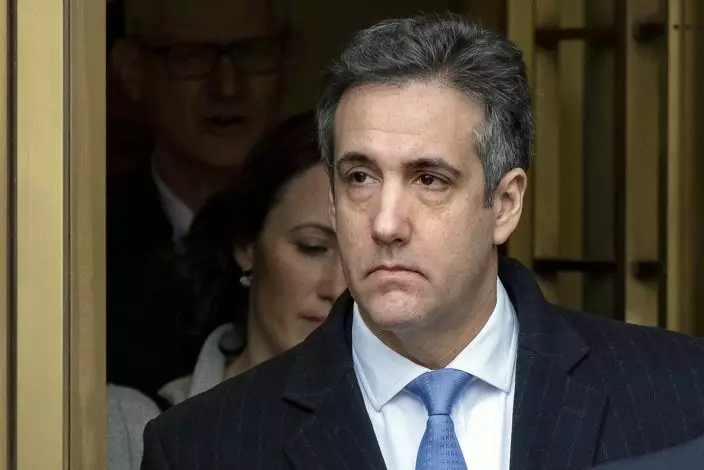When special counsel Robert Mueller closed the books on the Russia investigation, he produced a report of more than 400 pages, and Attorney General William Barr held a news conference outlining the reasons the Justice Department didn't charge President Donald Trump.
But in stark contrast to the Mueller inquiry, federal prosecutors in Manhattan have remained tight-lipped about their rationale for charging only Michael Cohen, Trump's former attorney and fixer, in a hush-money scandal in which they publicly implicated the president and investigated others in his orbit.
There was no news conference or press release announcing the end of the investigation this week. The U.S. Attorney for the Southern District of New York, Geoffrey Berman, has stayed silent on the matter. His office declined to answer questions.

FILE - In this Dec. 12, 2018, file photo, Michael Cohen, President Donald Trump's former lawyer, leaves federal court after his sentencing in New York. Search warrants unsealed Thursday, July 18, 2019, shed new light on President Trump's role as his campaign scrambled to respond to media inquiries about hush money paid to two women who said they had affairs with him. The investigation involved payments Cohen helped orchestrate to porn actress Stormy Daniels and Playboy centerfold Karen McDougal. (AP PhotoCraig Ruttle, File)
The closure of the case became public only because news organizations, including The Associated Press, petitioned a judge to release search warrants related to the FBI raid of Cohen's office and hotel room last year.
It was amid that litigation — and at the behest of a federal judge— that prosecutors revealed in a court filing this week that they had closed their investigation into the campaign finance violations Cohen committed when he arranged payments to silence two women who claimed they had extramarital affairs with Trump.
That probe, begun in 2017, turned up evidence that Trump himself was aware of the payments, despite his initial public claims to know nothing about them, including a recording in which Trump can be heard speaking to Cohen about efforts to buy the continued silence of Karen McDougal, a Playboy model.
Prosecutors went as far as saying in court filings that Trump directed Cohen to make the payments, though they referred to him in court filings as "Individual 1," not by name.
The U.S. House Oversight Committee on Friday asked prosecutors to produce documents and evidence in the case, saying they wanted to get to the bottom of the decision to charge Cohen but no one else.
"The committee is seeking to determine whether the internal Department of Justice policy against indicting a sitting president — the same policy that prevented Special Counsel Robert Mueller from bringing an indictment against President Trump for obstruction of justice in the Russian election interference investigation — played any role in your office's decision not to indict President Trump for these hush money crimes," the committee's chairman, Maryland Democrat U.S. Rep. Elijah Cummings, wrote in the letter.
"The office of the president should not be used as a shield for criminal conduct," Cummings added.
They asked that the records be produced by Aug. 2.
The U.S. attorney's office declined to comment.
Federal prosecutors generally don't offer public explanations for investigations that fail to lead to criminal charges, but they sometimes make exceptions in cases of public importance.
The U.S. attorney in Brooklyn this week, for instance, summoned reporters to explain why the Justice Department decided not to prosecute a white New York City police officer accused of using a banned chokehold in the 2014 death of an unarmed black man, Eric Garner, calling the case a "terrible tragedy" but one that didn't warrant civil rights charges.
Former FBI Director James Comey made detailed public statements after deciding not to recommend charges in an investigation of Hillary Clinton's use of a private email server during her time as secretary of state. Comey told reporters he believed the "American people deserve those details in a case of intense public interest."
In 2017, acting U.S. Attorney Joon Kim announced he would not bring public corruption charges against New York Mayor Bill de Blasio, a Democrat now running for president, after an investigation into alleged campaign finance violations.
"I find it odd they haven't made clear what happened here," Matthew Miller, a former Justice Department spokesman during the Obama administration, said of the Justice Department's decision not to say anything publicly about the end of the Cohen investigation.
"They've set up this system in which the president is treated differently than anyone else in the country," Miller said. "Given that they publicly named the president as having directed a crime, it makes no sense for them to end this investigation without at least telling Congress what they found."
Bruce Green, a former prosecutor in the Southern District of New York, disagreed, saying it is "unusual and extreme" for federal prosecutors to explain a decision not to prosecute.
"It's not the ordinary practice," said Green, who directs the Louis Stein Center for Law and Ethics at the Fordham University School of Law. "I don't think there's an exception in this case."
Trump has denied that the payments to McDougal and another woman, the porn actress Stormy Daniels, were a private matter and didn't violate campaign finance rules. While castigating Cohen as a liar, Trump has also said he doesn't believe his former lawyer should have pleaded guilty to the charges.
Federal prosecutors revealed in a court filing this week that they also had investigated whether anyone had given false statements during the inquiry or otherwise obstructed justice, but didn't reveal who those people were.
Associated Press Writer Michael Balsamo in Washington contributed to this report.










